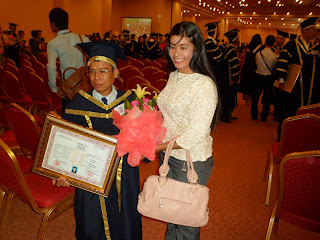I want to say something about how amazing mothers are, but
I’m not sure where to start. The Khmer word for “mother” madai sounds a lot like madtayh, the word for “red hot chili pepper.” I think that’s a good
place to start.
A couple of weeks ago, I came down with a tiny little cold.
Mala immediately prescribed me with a bucket of hot water for my feet and a
thermos full of hot water with slices of ginger and lime stuffed in there. The
concoction was rather pungent, but I was grateful nonetheless. It reminded me
of the honey-lemon-ginger tea my own mother makes for me when I have a cold. Mala
has also given me a lot of relationship and life advice, (half of which I
understood, and some of which I can follow). She gave me a head massage
when I head a headache, and held my hair back when I was puking my brains out
into a plastic bag. On rainy days, she brings an extra raincoat to work,
because she knows I will probably forget mine, and she makes sure I am full
(all the time). She inspires me with her stories and her joyful, compassionate
attitude. She reminded me to be thankful for my family. She grew up without one, but I have the best one in the world.
The maternal mortality rate is high here, and many children grow up without a mother. Even when the mothers are alive, desperation and skewed social systems often cause mothers to neglect their children as they have to go off and work, or they force their children to stand in the roads to beg, or even sell their daughters to brothels. I'm thankful for a loving mother as I look around and see the what poverty can do to the sanctity of motherhood.
I was inspired recently by the story of Mu Sochua, member of parliament and the first female secretary general of a political party in Cambodia, defender of women's rights to the point that she has been threatened with imprisonment, Nobel Peace Prize nominee, and mother of 3. Below is a letter she wrote after being threatened by the government for her actions.
As I Walk to Prison--Mu Sochea
The maternal mortality rate is high here, and many children grow up without a mother. Even when the mothers are alive, desperation and skewed social systems often cause mothers to neglect their children as they have to go off and work, or they force their children to stand in the roads to beg, or even sell their daughters to brothels. I'm thankful for a loving mother as I look around and see the what poverty can do to the sanctity of motherhood.
I was inspired recently by the story of Mu Sochua, member of parliament and the first female secretary general of a political party in Cambodia, defender of women's rights to the point that she has been threatened with imprisonment, Nobel Peace Prize nominee, and mother of 3. Below is a letter she wrote after being threatened by the government for her actions.
As I Walk to Prison--Mu Sochea
Over the years, I have had many wonderful “mothers” who have
taken care of me and encouraged me, whether they be the parents of friend,
aunties, or college roommates. But none of them have been so great as THE
mother:
The one who came to my cross country meets, rain or shine,
and stood at the top of gut hill screaming for me to run faster, and then when
I reached the top, she would race through the forest to scream as I crossed the finish
line...
The one who was on stage when I walked across in my big-girl heels to receive a high school diploma, and gave me a big, teary hug...
The one who always danced along to the terrible music I blasted
while she cooked up a feast, even after a hard day of work...
The one who edited essay after essay, listened to me
blast my trumpet, and read to me about fantastic kingdoms as I fell asleep...
The one who I call when I am upset, or have a funny story to
share, or just need to bounce ideas off of someone, even at age 21, even across the ocean...
The one who…well…birthed me...
And the one who encourages me through the hard times and taught me about standing up for justice and peace and love in this world that sometimes seems to be torching the very mention of those words.
(She also held my hair back for many a puke-fest).
And the one who encourages me through the hard times and taught me about standing up for justice and peace and love in this world that sometimes seems to be torching the very mention of those words.
(She also held my hair back for many a puke-fest).
Mama’s birthday was October 3. Mala’s birthday was October
10. It’s a little late for both of them, but I'm declaring October International Mother's Month.
If you're reading this, take a moment to be thankful for your mother. Lose the excuses. Do it.
If you're reading this, take a moment to be thankful for your mother. Lose the excuses. Do it.
































